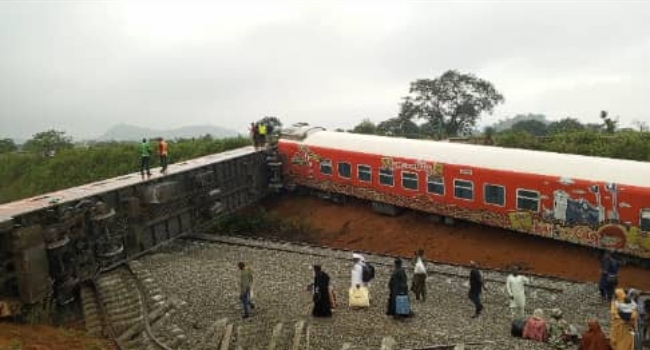The Nigerian Safety Investigation Bureau (NSIB) has confirmed that the Abuja-Kaduna train derailment, which occurred on August 26, 2025, injured 12 people out of the 583 passengers that were on board the Asham train.
Addressing journalists in Abuja on Tuesday, the Director-General of the NSIB, Capt. Alex Badeh said that the preliminary report on the incident will be published within the next 23 days.
“Within 23 days, we should be able to make public the preliminary report of the investigation. The report would contain some of the factual evidence that is related to the occurrence, at least those that will give us a way forward on the way the investigation is going to go. So, within 23 days, we should provide you with the preliminary report,” Badeh said.
Badeh explained that the Bureau needs additional funding to acquire modern investigative tools and provide advanced training for its investigators so that they can handle incidents beyond the aviation sector.
“Some funding has been made available, but it’s not enough. If you look at the NSIB Act again, we’re still battling with the same case of funding. At the NSIB, we’re trying to prevent this accident and funding is one big part of this.
“We require funding to train our investigators, not just in aviation, but now you see with rail, maritime, all the others. Yes, we have some training, but more extensive training is needed, especially with the expansion of rail services in Nigeria, and then more equipment to investigate these accidents. So yes, we do require more funding,” he said.
He stated that the investigation would involve a comprehensive technical assessment of the locomotives, coaches, and other rolling stock to determine the root cause of the derailment and develop safety recommendations.
“The NSIB has appointed an Investigator-in-Charge based on qualifications to organise, conduct, and control the investigation. The IIC has full access and control over the accident site, evidence, and relevant records, including the protection and custody of rolling stock, locomotives, contents, and other evidence to prevent disturbance or tampering.
“Evidence protection measures include securing the site, restricting access, and coordinating with railway security authorities, police, and other relevant entities. Recorded data from the train, including vigilance control systems, speedometers, on-board CCTV cameras, and over-speed trip mechanisms, will be preserved and analysed,” Badeh stated.
The Bureau added that it may engage technical experts to support the IIC and could delegate aspects of the probe where necessary, while maintaining alignment with any judicial panels or tribunals investigating the incident.
The DG noted that the inquiry involves site inspections, track geometry assessments, analysis of switches and infrastructure, and reviews of NRC operational records.
The NSIB will also carry out interviews with train crew, staff, responders, passengers, and eyewitnesses, as well as gather organisational information from the operator to determine causal and contributing factors.
Recorded data from the train will be carefully analysed and secured from unauthorised use or disclosure in legal proceedings.
Badeh further explained that if the investigation uncovers international implications, the NSIB will notify relevant States and may invite accredited representatives or advisers to take part, while respecting their rights and obligations.
It will be recalled that a Kaduna-bound train derailed on August 26 at KM 49, between Kubwa Station and Asham Station.

